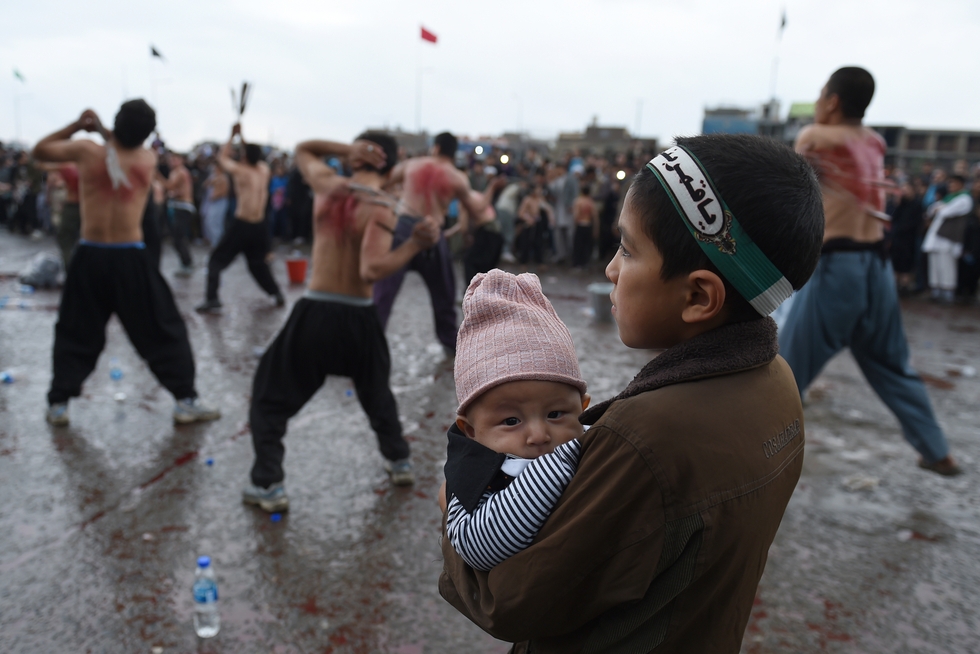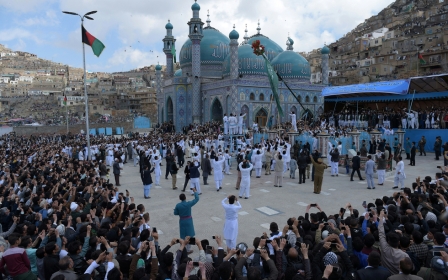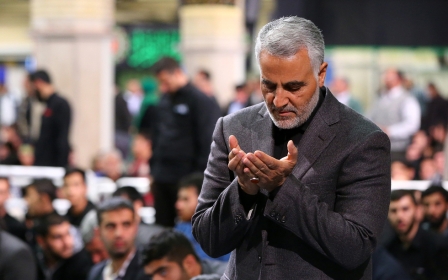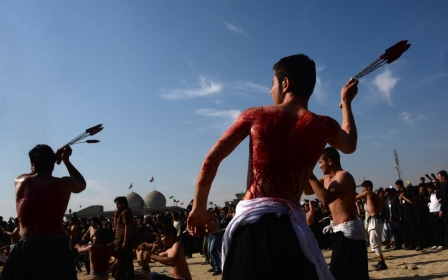Afghan refugees are paying ultimate price for Iran’s war in Syria

Several reports confirm that Iran is exploiting the situation of undocumented Afghan refugees and asylum seekers to fight in Syria. About 20,000 Afghans have already been recruited and fighting the Syrian war in the name of faith, and economic benefits that could potentially allow them to have a long-term stability.
According to the United Nations High Commissioner for Refugees (UNHCR), there are over two million Afghans residing in Iran without any immigration status. The Iranian government has routinely initiated controversial deportation campaigns targeting the Afghan refugee and migrant populations violating the very basic rights and freedoms they are entitled to, enshrined in the Universal Declaration of Human Rights.
The government of Iran has applied rigmaroles in order to control the movement of Afghan refugees, restricting their right to work only to manual labour and preventing them from owning businesses and working as street vendors (most notably Article 48 in 2000).
Afghans are not permitted to buy property and their children are restricted to attend state-run schools; even when kids are able to attend and afford private schooling, they often face physical abuses and discrimination. This has led the migrant community to establish informal Afghan-run education systems that lack standardised curriculum.
Evidently, the Iranian authorities have systematically limited opportunities for Afghans to permanently settle or claim refugee or any other status, making them feel politically and economically excluded and demoralised. Despite the shared language, ethnicity (Hazara), religion (Shia) and history, first- and second-generation Afghans are finding it difficult to integrate into mainstream Iranian society.
Afghans who reside in Iran live in constant fear of deportation. They cannot return to their country of origin due to the deteriorating economic and security situation. It’s no wonder that the Afghans are turning to extreme measures as they run out of any acceptable alternatives.
These are the dire and duress circumstances under which Afghans are being recruited to fight - and die - in Syria, where Iran is backing the regime of President Bashar al-Assad.
Around 700 Afghans are thought to have been killed in Aleppo and Deraa alone. While many Afghan fighters may have been coerced into believing this is a benevolent act for Islamic solidarity to protect the Zeynab shrine (a Shia pilgrimage site near Damascus), others are just following orders out of sheer desperation and powerlessness.
The Ministry of Foreign Affairs has dismissed allegations that the refugees were coerced into this act. They have claimed that the refugees have volunteered to fight in Syria out of political or religious beliefs.
What the Iranian Foreign Ministry forgot to mention was that Afghans with temporary status have been promised a big award and permanent immigration status to join the Fatemiyon brigade (the Afghan division of Revolutionary Guards).
Some of the Afghans who have been manipulated into joining the division are former prisoners, who are told they will be exonerated and released from prison, where they are held on charges including drug trafficking, a crime which is punishable by death in Iran. The Iranian Revolutionary Guards Corps (IRGC) have implemented this cunning game of Islamic solidarity crafted and backed up by Ayatollah Ali Khamenei, who holds the supreme authority in the country.
Some Afghans have told Human Rights Watch that they or family members had fled to Greece and been deported back to Afghanistan after refusing to fight, while a 17-year-old told the human rights group that he had been "forced into fighting without any chance of refusal”.
Iranian Supreme Leader Ayatollah Ali Khamenei has reportedly been visiting the families of Afghan refugees and asylum seekers, who have now been detained in Syria and/or have been killed, melodramatically demonstrating Islamic and Shia ethnic solidarity.
Khamenei’s regime is utilising all the tools at its disposal to promote its militant strand of fundamentalism. Afghan refugees and asylum seekers in Iran are being utilised as an unwanted surplus that can be disposed of at will. Desperate, poor and vulnerable Afghans are caught up in Iran’s notorious expansion of fundamentalism in the Islamic world.
Iran has been under religious rule for the past 37 years and it should learn of the lessons from its own past and the lingering effects of fundamentalism from the conflict in neighbouring Afghanistan. In that respect, the Syria conflict has increasingly started to resemble the Afghan experience of war, instability and a fundamentalist regime just a year after the Iranian revolution in 1978.
This form of abuse has reached its apex. Afghan refugees and migrant population are facing systematic abuses at the hands of Iranian security forces. The human rights situation of Iran is not an episodic problem. The country has been criticised for its repressive policies that subordinate human rights concerns at home for regional strategic interests.
The international community has done little or nothing to protect the rights of Afghans in Iran, even though the country has an obligation under the 1951 Refugee Convention to protect the vulnerable refugees. The discussions at international platforms often degenerate into empty and circular arguments. Afghan authorities and media have largely been silent on this issue.
Iran’s ongoing support for the Assad regime may backfire, especially as Iran appears to be heading towards a cultural evolution since the election of President Hassan Rouhani, who has promised to make Iran an economic powerhouse.
After the economic sanctions were lifted from Iran earlier this year, the president described the moment as a “golden page” in the history of the country. The deal has provided Iran an opportunity to become an active member of the international community and has strengthened its position. But while the country is at a turning point, it has nevertheless already begun to confirm the fears that it remains a destabilising factor in the Middle-East region that violates human rights at home and backs terrorism and radical agendas abroad.
The decision to send Afghan refugees in the name of Islamic solidarity to fight in Syria will continue to have an impact on the long-stalled Syrian peace process. It will be counterproductive for Iran and the West who are navigating the possibilities to put an end to the Syria war by enlisting Iran as an ally to help in the fight against the Islamic State. Ultimately, in this power struggle, hundreds of thousands of Afghan refugees and their families will continue to suffer.
- Ritu Mahendru is a freelance journalist based in London. She has previously worked and lived in Afghanistan. Ritu has a PhD in Sociology and is a published author. She writes about gender, race, migration, conflict and development issues. You can follow her on Twitter @ritumahendru
The views expressed in this article belong to the author and do not necessarily reflect the editorial policy of Middle East Eye.
Photo: An Afghan boy holds a child as he watches Shiite Muslim devotees beat themselves with chains and blades as part of a self-flagellation ritual during Ashura commemorations in front of the Abul Fazl Shrine in Kabul on 24 October, 2015 (AFP).
New MEE newsletter: Jerusalem Dispatch
Sign up to get the latest insights and analysis on Israel-Palestine, alongside Turkey Unpacked and other MEE newsletters
Middle East Eye delivers independent and unrivalled coverage and analysis of the Middle East, North Africa and beyond. To learn more about republishing this content and the associated fees, please fill out this form. More about MEE can be found here.





